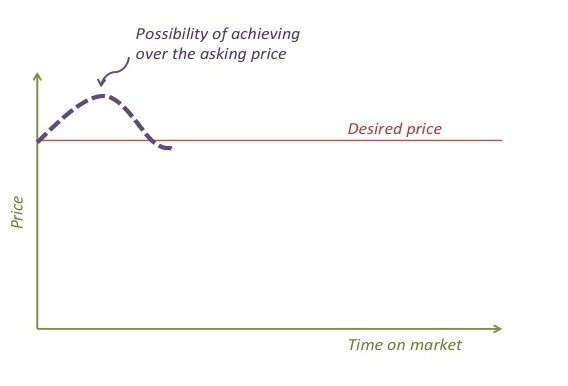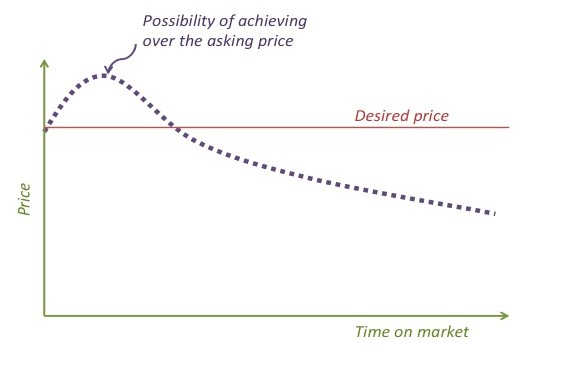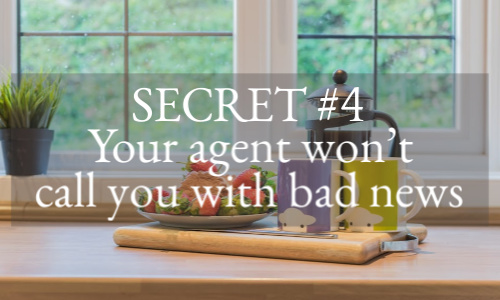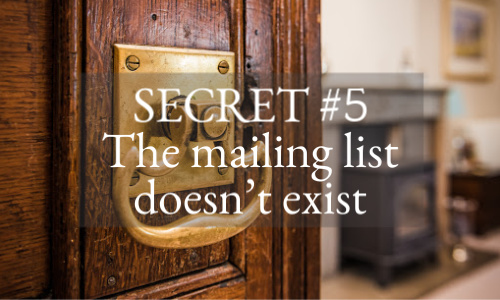When you’re selling your home, it seems that everyone knows something you don’t. Why that viewer didn’t buy, even though they gushed over your new lino; why your estate agent isn’t returning your calls; and why your next-door neighbour sold in a week for over the asking price, yet yours has been on the market for months without a bite?
It’s not a grand conspiracy, honest. Over the last fifteen years or so I’ve worked with over 1000 homeowners, and talked to at least 5000, and from all those conversations, I’ve compiled a list of all the things you should probably know when you’re selling, then distilled them to the top five. And I’m telling you them, because no one else will.
Here are my top five selling secrets you need to know when you’re selling your house. (Don’t shoot the messenger.)
Selling Secret Number 1:
The first offer you get will probably be the best offer you will ever get
Did you decline an offer in the first month or so that, in hindsight, you now would take? It’s a familiar story. In fact, around 75% of sellers who contact us would now accept that offer – gladly – and now regret having rejected it.
On average, 100,000 house sales transact every month, and there are currently around a million homes on Rightmove. That means that it would take ten months to sell all the properties on there. But of course, new properties are coming to the market every single day. On average, only about half the properties on the market each year actually sell. This figure is higher in urban areas, where properties tend to sell within the first ten weeks or so, and much lower in rural areas, where it’s not unusual for a property to languish on the market for years.
A property is never more desirable than when it first goes onto the market. The initial flurry of interest can even occasionally generate an offer in excess of the asking price, such is the draw of a newly-marketed home. The interest curve for those all-important first few weeks looks something like this.
However, once all the buyers who have been searching for a while for their next home have seen it, then it’s only the new buyers coming to the market who are around to show any interest, and this may be only a handful a week, at best. This just isn’t sufficient to instil any sense of urgency in a buyer, who may view 15 – 20 or more properties before making an offer on one.
Once your property has been on the market for more than a couple of months therefore, the interest curve looks more like this:
If you drop your asking price, and keep dropping it in an attempt to counteract this downwards trend of interest, all you’re doing is ‘chasing the market down’, in effect.
So what’s the answer? Here are my top five tips for keeping your property marketing fresh, and avoid it becoming stale and forgotten:
1. Don’t dismiss out of hand any offer you receive in those crucial early weeks of marketing. It will probably be the best offer you will ever receive on your home.
2. If you’re several months (or years) down the line, you need to break the vicious cycle that is no one wants a house that no one wants. Take it off the market completely for at least two months, and preferably up to six months.
3. Re-launch at the right time of year for your property, ie at the time of year when your buyer is most likely to be searching.
4. Don’t scrimp on your re-launch: engage a professional home stager, commission a professional photographer, and choose a proactive agent who believes in quality marketing.
If you get an early offer when you go back to market, take it! Within reason of course…. As a general rule of thumb, anything in excess of 90% of your asking price is definitely worthy of consideration in this market, and over 95% is a terrific offer.
Selling Secret Number 2:
Your estate agent (probably) isn’t good enough to photograph your house
Most agents think they are: believe me. But interior photography in particular needs a pro on the task. Interiors are fraught with challenges, just waiting to trip up the amateur – blown windows, strange angles and dark shadows are all evident in most of the amateur property images I see every day on Rightmove.
External photography is much easier, as an amateur blue-sky shot is always going to have the edge over a professional white sky image. Some of the best external front shots of properties are actually taken by the homeowner themselves!
If your agent really can’t be persuaded to use a professional to photograph your house, you need my help to make sure that your images look as good as they can do, under the circumstances.
Here are my five secrets to getting great property images:
1. Clean and clear – clear surfaces and floor spaces, take up rugs where necessary, and clean everything until it sparkles. Light and reflected shine are the best ways to show off the size of your rooms – NOT wide-angled lenses!
2. Go shopping! Shop for staging accessories and give your home the star treatment:
Kitchen – croissants, champagne, flowers
Living rooms – candles, flowering plants, lifestyle magazines and coffee table books
Bathrooms – fluffy white towels, luxury toiletries
Outside – flowering plant for patio table centre, pretty tealight holders
3. The better you brief the photographer, the better the images will be! Go round the house making a note of any particularly attractive angles or features, then call him as close as possible to the day he is due, so your requests are fresh in his mind.
4. Make sure the photographer knows what time of day the sun will be on the front of the house. Think also about evening shots, and when the sun will be on the garden. This may necessitate two separate visits so make sure the photographer has allowed for this.
5. Follow him round! Plump cushions, move chairs, take away any distracting objects, remove bins and washing. Make sure you can see what he’s photographing so you can anticipate any potential for the room not looking its absolute best. Put lamps on, or turn lights off, to keep the ambient light at the right level. A good photographer will really appreciate your help and will guide you throughout.
Keep your images seasonal– it’s very telling to see a house advertised in September with daffodils in the garden, or in January with Wisteria in full bloom. Keep your property photography as close as possible to the current season. This often means asking your agent to revisit to refresh your images with new ‘foliage’ shots. After all, you may not want your viewer to know how long your house has been for sale – and why give them an excuse to make a low offer?
Selling Secret Number 3:
If your house doesn’t sell quickly, your agent will assume it’s the price
If not the asking price that is preventing a house from selling, then what else could it be? An agent is much more likely to blame the price than his marketing, but in my experience, a few tweaks in the marketing can have a more positive impact on interest than dropping the asking price of a property.
Here are my top three reasons not to drop your asking price:
1. If you don’t believe in your asking price, why should your buyer? Be confident your home is worth what you’re asking. Your confidence will be infectious, and be transmitted to your viewers via your agents.
2. It’s a downward spiral – where will it all end? You don’t want to give it away. Make sure you sell on value, not on price.
Most of the time, it doesn’t work – sellers who contact us have almost always already dropped their price, sometimes several times, but they still haven’t sold their homes. Who wants to buy something at a falling price?
Selling Secret Number 4:
Your agent doesn’t want to call you when he has bad news or no news.
It’s difficult for both you and your agent when the market is slow; they don’t have anything to tell you, so not only will they stop calling, they may even start avoiding your calls too. Meanwhile, you’re left feeling frustrated and powerless, wondering what on earth you can do when no one wants to view your home.
Communication between you and your agent at this tricky time becomes all the more important. Without communication, there can be no trust, and without trust, there is no worthwhile relationship. But when you’re in a locked loop of your agent not calling because there’s no interest, yet you need to know what you can do to improve the situation, it’s easy to become despondent.
Here are my top five communication tips when you’re trying to sell your home, to ensure the relationship doesn’t degenerate irretrievably:
1. Pre-empt any issues by agreeing a communication schedule before you launch your home to the market. This is over and above any calls to arrange viewings, or to give feedback afterwards; this plan outlines your expectations and so your agent has some chance of meeting them. With a plan agreed in advance, there are clear expectations and if these are not met, you can refer your agent back to their original agreement.
2. Keep your communication positive – if your agent feels that they are being told off, or held to account, for a lack of interest in your property, they will be increasingly reluctant to pick up the phone to you. If however, your tone is encouraging, friendly and supportive, they will look forward to speaking to you, and they will be only too happy to have a chat to you, even if there is nothing concrete to report.
3. If you’re in town, near your agent’s office, pop in. Take them cakes, or flowers out of your garden for the office. If they offer to make you a cup of tea, even better. Agents are just like me and you; they have favourite clients, so make sure you’re one of them.
4. Ask for advice: lots of vendors do this, but then they either don’t listen to any suggestions, or else they argue with it. If you genuinely listen and show that you value any input that might improve the level of interest in your property, you will find your agent much more confident about discussing the issues with you.
5. Share your plans with them: if your agent knows how important your move is, perhaps to be closer to a special relative, to give yourself more financial security, or to realise your long-held dream of living in the country, they will be able to genuinely identify with your aspirations.
Selling your home should be a team effort, and anything you can do to help your agent will in the long run, only benefit you even more. So be nice, be friendly, and be kind. They are all big softies really!
Selling Secret Number 5: The mailing list doesn’t really exist
The Mailing List Myth
Once upon a time, when estate agents didn’t have the internet, they had to actually talk to potential buyers on the phone – or in person – to discover their house-buying requirements and budget. All this information would be carefully kept and meticulously matched against new properties as they were listed. This record was called a mailing list.
If you were a buyer, you would need to register on the mailing list of every agent in your chosen location, or else miss out on any new and potentially desirable properties coming onto the market.
In those good old days, an agent was only as good as his mailing list. So, the Knight Franks and the Savills had long lists of big spenders wanting county piles, and the little independent agency offices would mop up all the first-time buyers, as well as the pensioners looking for sheltered accommodation.
Then along came the magical World Wide Web. Now, buyers no longer had to phone each agent’s office and laboriously give all their details over and over; instead, they could enter their requirements in the simplest form – no contract details needed – and see instantly what was available for them. Fantastic! But what about the agent with his precious database of buyers? Is he redundant?
Well yes, and no.
Yes – because buyers don’t need him anymore, because the information they need that was previous held captive by the agents, is now publicly and freely available.
But no – because the agent still needs the buyers. A really good agent will understand that the internet is just a filtering device for buyers, who will often screen out properties that may actually be suitable, judged purely on an unflattering photograph, or an optimistic asking price. The agent’s skill is in matching houses to buyers, and that takes experience, enthusiasm and a genuine liking for his clients.
Buyers need to trust their agent to guide them through the complicated maze that is house hunting, and accept coaching from him to make good decisions. These skills and this experience cannot be replaced by an internet search.
No matter how detailed and comprehensive property portals become, the vast majority of us will still look to a real person when it comes to making one of the largest purchase decisions in our lives.
The mailing list may be dead, but the proactive estate agent is still very much alive and kicking.
If you’d like my help to sell your home more effectively, please answer a few short questions here and if I think I can help you, I’ll be in touch.









